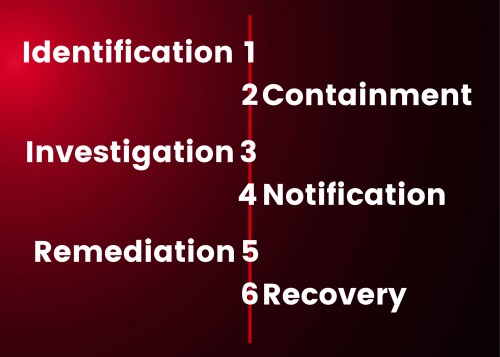
Cybersecurity is a critical aspect of the healthcare business, as healthcare organizations are responsible for storing and protecting sensitive patient data, including medical records, financial information, and personal identification data.
Here are some key points to consider regarding cybersecurity in the healthcare business:
- Must comply with relatory requirements realted to cybersecurity, such as HIPAA (Health Insurance Portability and Accountability Act) in the United States.
- Must implements measures to prevent data breaches and protect sensitive information from unauthorized access or theft. These measures may include firewalls, encryption, access controls, and employee training programs.
- Must have incident response plans in case of a cybersecurity incident or data breach. These plans shouldinclude steps for notifying patients and regulatory authorities, as well as steps for remediation and recovery.
- Must monitor their networks and systems for signs of cybersecurity threats, such as malware or unauthorized access attempts. This may require the use of security software and the engagement of security experts.
- Must ensure that their third-party vendors, such as electronic health record (EHR) providers, also comply with cybersecurity requirements and have adequate security measures in place.
HIPAA
HIPAA, which stands for Health Insurance Portability and Accountability Act, is a federal law enacted in the United States in 1996. One of the key purposes of HIPAA is to protect the privact and security of personal health information, including electronic health records (EHRs). HIPAA includes regulations and standards that healthcare organizations must follow to safeguard the confidentiality, integrity, and availability of patient information. These regulations cover a wide range of security measures, such as administrative, physical, and technical safeguards, as well as policies and procedures for risk analysis and management.
The HIPAA Security Rule, which is part of the regulations, establishes national standards for the security of electronic protected health information (ePHI). This includes requirements for access controls, data encryption, audit trails, contingency planning, and employee training, among other things.
In addition to the Security Rule, HIPAA also includes the Privacy Rule, which governs the use and disclosure of patient information, and the Breach Notification Rule, which requires healthcare organizations to notify patients and regulatory authorities in case of a data breach. Failure to comply with HIPAA regulations can result in significant penalties, including fines and legal action. Therefore, healthcare organizations are responsible for ensuring that they are in compliance with these regulations and taking appropriate measures to protect patient information from cybersecurity threats.
Preventative Measures
In the healthcare industry, cybersecurity has become a critical component in safeguarding patient data and ensuring the continuity of healthcare services. Healthcare organizations store and process sensistive patient information, such as personal health records, medical histories, and payment information. Any cyber attack on these systems can lead to significant financial losses, reputational damage, and legal consequences.
Therefore, it is essential for healthcare organizations to have robust cybersecurity measures in place. Here are some of the measures that can help safeguard healthcare:
- Encryption: Encryption is the process of converting sensitive data into a coded language that can only be deciphered with a decryption key. Healthcare organizations should encrypt all patient data at rest and in transit to prevent unauthorized access and data breaches.
- Access controls: Access controls like passwords, biometric authentication, and two-factor authentication can prevent unauthorized access to patient data. Healthcare organizations should enforce strong password policies and limit access to patient data to unauthorized personnel only.
- Firewalls and intrusion detection systems: Firewalls and intrusion detection systems can help prevent cyber attacks and detect malicious activity on the network. These systems can also automatically block access to suspicious IP addresses and prevent malware from entering the system.
- Employee training: EMployees are often the weakest link in cybersecurity. Healthcare organizations should conduct regular cybersecurity training sessions to raise awareness of cybersecurity risks and educate employees on best practices like avoiding phishing emails and not sharing login credentials.
- Incident response plans: Healthcare organizations should have incident response plans in place to quicly respond to and recover from cyber attacks. These plans should include procedures for identfying the source of the attack, containing the attack, and restoring normal operations.
Incident Response Plan
Yes, having an incident response plan in place is essential for healthcare organizations to respond quickly and effective to cybersecurity incidents or data breaches. An incident response plan outlines the steps that the organization should take in case of a security incident
The incident response plan should be regularly reviewed, tested, and updated to ensure its effectiveness and relevance. It should also be communicated to all relevant stakeholders, including employees, contractors, and third-party vendors. Having a well-designed and effective incident response plan in place can help healthcare organizations minimize the harm caused by cybersecurity incidents and data breaches, protect patient information, and comply with regulatory requirements.

Incident Response Plan
Monitoring networks and systems for cybersecurity threats is an important aspect of maintaining a secure healthcare IT environment. Healthcare organizations must be vigilant and proactive in detecting and preventing security incidents before they can cause damage to patient data and other critical systems. This may involve the use software, such as firewalls, intrusion detection systems, and antivirus software, which can detect and block malicious activities in real-time.
In addtion to security software, healthcare organizations may also need to engage the services of security experts, such as information security consultants or managed security service providers (MSSPs). These experts can provide specialized expertise and resources to help healthcare organizations detect and respond to cybersecurity threats. They can help develop and implement a comprehensive cybersecurity program, conduct vulnerability assessments, and perform regular penetrationtesting to identify and address security weaknesses.
Monitoring networks and systems also requires a thorough understanding of the latest cybersecurity threats and trends, as well as the ability to stay up-to-date with the latest security technologies and best practices. Healthcare organizations must ensure that their IT staff receive regular training and education on the latest cybersecurity threats and techniques, and that they have necessary skills and tools to detect and respond to security incidents promptly.
EHR
Healthcare organizations must ensure that their third-party vendors, such as electronic health record (EHR) providers, comply with cybersecurity requirements and have adequate security measures in place. This is important because third-party vendors often have access to sensitive patient data and can pose a significant cybersecurity risk if they do not have proper security measures in place.
To manage these risks, healthcare organizations should conduct due diligence on third-party vendors before engaging their services. This may involve reviewing their security policies and procedures, conducting security assessments or audits, and verifying their compliance with relevant regulations and standards, such as HIPAA.
In addtion to due diligence, healthcare organizations should aslo include cybersecurity requirements in their vendor contracts, including provisions that require vendors to implement and maintain appropriate security controls and practices. Vendors should be required to promptly report any security incidents or data breaches and to coorperate with the healthcare organization in conducting investigations and remediation efforts.
It is also important for healthcare organizations to monitor the security practices of their third-party vendors regularly. This can include reviewing their security policies and procedures, conducting security assesments, requiring regular security reports or audits. Healthcare organizations should ensure that their vendors are held accountable for their security practices and that they are aware of the risks and potential consequences of non-compliance.
The healthcare business has a responsibility to store and protect sensistive patient data, which includes medical records, financial information, and personal identification data. This article emphasizes the importance of cybersecurity in the healthcare industry, as healthcare organizations are at risk of data breaches and cyber attacks. It highlights the key points to consider in implementing cybersecurity measures, including complying with regulatory requirements, preventing data breaches, having incident response plans, monitoring networks for threats, and ensuring third-party vendors have adequate security measures in place. Overall, the article emphasizes the importance of proactive and diligent measures to maintain an effective cybersecurity program to protect sensitive patient data and comply with regulations.
In a world where the internet connects everything, cybersecurity has never been more critical.
While having IT services and updated software and hardware is important, it is still critical to understand that today’s hackers target human behavior through social engineering hacks.
Thankfully there is training, software, and help available for individuals and small businesses!
Straight Edge Technology highly recommends you partner with an IT service provider if you are a small business. Even if you have your own IT department, it is good to receive coaching and another set of eyes on your company’s security.
We offer support for a variety of industries including:
If your business is looking for IT services in San Antonio, Corpus Christi, or the surrounding cities in Texas, then contact our team at Straight Edge Technology today.
We would love to talk with you, discuss your company’s goals, and plan how your IT can work for you in growing your business!
